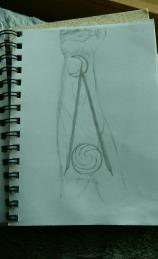So, lately, in part due to my book but also due to me just being interested in it, I’ve been doing a lot of research into dozenal. This is still going in my Worldbuilding series, but I think I want to focus specifically on the numbers and the math for this. So, let’s talk about it.
If you don’t know, dozenal (or duodecimal) is a system of counting. Most countries use the decimal system, counting up to nine and then starting a separate column of numbers for tens, then hundreds, and so on. This is also called Base-10. Dozenal, on the other hand counts up to eleven, then starts a new column for twelves (or dozens), then another column for twelve twelves (144, or a gross). This is also called Base-12.
So, counting in dozens has some really really cool properties. One of my favorite is pretty commonly cited, and that is how easy it is to do fractions. Because every number after the period (0.1, for example) is expressed as that many twelfths, rather than that many tenths, 1/3 is just 0.4 instead of 0.333… This is because a third of 12 is 4, so a third of 1 is expressed as 4 twelfths. Also, a dozen can be halved twice, where ten can only be halved once, until you get into decimals (or dozenals, I suppose): 12>6>3>1.6 or 10>5>2.5
But there are many many more properties that make dozenal so cool. It was used (and sometimes still is) in weights and measures, especially when it comes to shipping and commerce, because of it’s utility in being divisible into thirds or sixths or halves.
I guess that’s still fractions… But there is also the fact that you can count higher on your fingers with dozenal. What you do is you count finger segments with your thumb, rather than fingers. So, one hand has four three-segment fingers, which adds up to twelve: yay! Then you use the other hand to count how many dozens you’ve already counted. This means you can count up to twelve dozen (or a gross, but that sounds kind of… gross.)
How does this have literally anything to do with your book?
Great question! As I mention in my previous installment, small things in a fantasy world can have massive effects. What if, early on, some empire in your world decided dozenal would be a better system and forced everyone in their nation to use it. (that might seem silly, but France kinda did that with decimal in 1795.) If the empire was influential enough, it would not be surprising if the whole world followed suit. And that is what I have in my book.
The Myrian Empire (the focus of my first book) switched to dozenal for a variety of reasons about a thousand years ago. As it grew, other nations switched to dozenal to be able to trade more effectively. This, I feel, fits the narrative of my world pretty well, too. And as I’ve said before, the thing that matters most when worldbuilding is making sure the things inside your world fit together.
Now, this is all not to say that other bases do not have their own merits. Base-6 can be more useful than Base-12 in a lot of places. Base-16 (hexadecimal) is liked by computer designers and programmers, and is pretty handy for sure. One of my favorites is Base-8, which shares a lot of it’s usefulness with hexadecimal. And many cultures had different systems of counting as well. The Maya use Base-20, and the Babylonians liked Sexagesimal (Base-60), which is one of the reasons we have sixty minutes in our hour, and 360 degrees in a circle.
And because different cultures, especially those that develop commerce and mathematics, will have different base systems, it’s important for worldbuilding to explore these. Maybe your world would not have had different systems, maybe it would, that’s up to you. But knowing whether or not it seems likely is important.
In my world (the Yolíja), specifically on Ardún, a handful of bases popped up. An older empire, Xaíkon, used hexadecimal, but only after a long period of Base-8 (possibly due to having only four fingers on each hand). Similarly, some of the smaller nations around Myria used Base-6, for counting, before Myria switched to Dozenal. Every facet of your world effects how it develops, which makes worldbuilding both terrifying and exhilarating.
Just remember, don’t let the nitty-gritty details. While it’s important that your world makes sense, it’s not so important that you should let perfectionism stop you from writing. Sometimes, things don’t need to make sense. Sometimes a writer gets to just say that a thing is so and it is so. This is your world, you make it what you want.

Only wanna input that you have a very decent web site , I love the pattern it actually stands out.
LikeLike
Thanks a bunch!
LikeLike